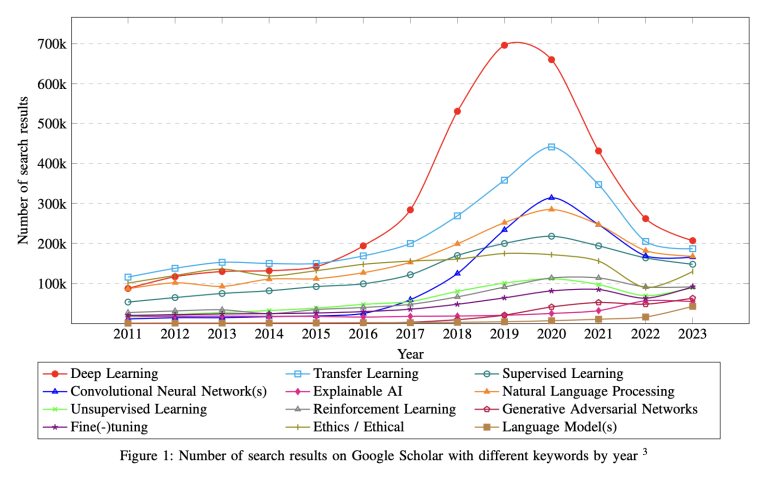
Generative AI, characterized by its focus on creating AI systems capable of human-like responses, innovation, and problem solving, is undergoing a major transformation. The field has been revolutionized by innovations such as the Gemini model and OpenAI's Q* project, which emphasizes the integration of mixture of experts (MoE), multimodal learning, and the expected progress toward artificial general intelligence. This development symbolizes a major shift from traditional AI techniques to more integrated, dynamic systems.
A major challenge in generative AI is to develop models that can effectively simulate complex human cognitive abilities and handle diverse data types, including language, images, and audio. Ensuring that these technologies comply with ethical standards and societal norms further complicates this challenge. The complexity and scale of AI research require effective methods for assembling and evaluating the expanding knowledge landscape.
A team of researchers from the Australian Academies of Polytechnics, Massey University, Auckland, Cyberstronomy Pty Ltd, and RMIT University conducted a comprehensive survey to discuss developments in major model architectures, including transformer models, recurrent neural networks, MOE models, and multimodal models. The study also addresses challenges related to AI-related preprints, examining their impact on peer review processes and scholarly communication. Emphasizing ethical considerations, the study outlines a strategy for future AI research that calls for a balanced and informed approach to MOE, multimedia, and artificial general intelligence in generative AI.
Transformer models, which are central to many AI architectures, are now supplemented and sometimes replaced by more dynamic and specialized systems. While recurrent neural networks have been effective at processing sequences, they have been increasingly eclipsed by newer models due to their limitations in handling long-range dependencies and efficiency. Many researchers have introduced advanced models such as MOE and multimedia learning methodologies to meet these evolving needs. MOE models are pivotal in taking diverse data types, especially in multimedia contexts, by integrating different data types such as text, images, and audio for specialized tasks. This trend directly affects the consolidation of the field, with increased investment in research involving complex data processing and autonomous systems.
The detailed methodology of the Ministry of Education's models and multimedia learning is complex and nuanced. MOE models are known for their efficiency and task-specific performance, leveraging multiple expert modules. These models are essential for understanding and taking advantage of the complex structures that are often inherent in unstructured data sets. Its role in the creative capabilities of AI is particularly notable, as it enables technology to engage in and contribute to creative endeavors, thus redefining the intersection between technology and art.
The Gemini model has demonstrated advanced performance on several multimodal tasks, such as natural image, audio, video comprehension, and mathematical reasoning. These developments herald a future where AI systems can dramatically expand their logic, contextual knowledge, and creative problem-solving capabilities, thus changing the landscape of AI research and applications.
In summary, ongoing developments in artificial intelligence are characterized by:
- Generative AI, especially through the Ministry of Education and Multimodal Learning, is transforming and reshaping the technological and research landscape.
- The challenge of developing AI models that mimic human cognitive abilities and comply with ethical standards remains significant.
- Existing methodologies, including MOE and multimedia learning, are pivotal in dealing with diverse data types and enhancing AI's creativity and problem-solving capabilities.
- The performance of technologies like the Gemini model highlights the potential of AI in various multimedia tasks, pointing to the future of expanded AI capabilities.
- Future research must align these developments with ethical and societal standards, which is a critical area for further development and integration.
Check the paper. All credit for this research goes to the researchers in this project. Also don't forget to follow us Twitter. joins We have 36k+ ML SubReddit, 41k+ Facebook community, Discord channelAnd LinkedIn Gramop.
If you like our work, you'll love our newsletter.

Hello, my name is Adnan Hassan. I am a Consultant Trainee at Marktechpost and soon to be a Management Trainee at American Express. I am currently pursuing my dual degree at Indian Institute of Technology Kharagpur. I'm passionate about technology and want to create new products that make a difference.

